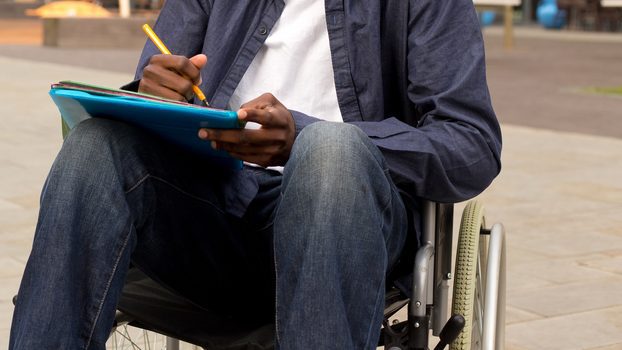Identifying as “Disabled” Brings Me Peace in a World Hostile to My Existence
Before I entered college, I never thought about disability. Or at least, I never thought about it with that exact word.
Mental illness. Mentally ill. Disorder. Burden.
These were all words I used to describe myself before “disabled” and “disability” became my home. Even as I struggled to seek accommodations and receive support for various mental health-related difficulties affecting my studies, “disability” as a term provided me comfort. It meant what I was dealing with was not a singular experience, and that I deserved care, whether just socially or in more concrete legal terms. Despite the difficulties I have had finding a place in disability conversations, disability has brought me peace in a world that constantly feels hostile to my existence.
As I look back on my time in college, however, I am left wondering: why did the process for obtaining accommodations feel so difficult and frustrating to navigate without prior experience? And more importantly, why did going through the process feel so alienating, as though seeking out accommodations was a public confession of weakness?
The answer is two-fold, relying on two underlying issues with how disability operates systematically in higher education.
The first issue arises from the fact that many higher education settings do not provide adequate administrative support for disability accommodations. Whether it is a lack of training for administrators working with disabled students or an unaddressed need for staff trained to help students with specific disabilities such as autism, many colleges are struggling with the accommodations process. Worse yet, structural concerns such as the phasing out of documents related to proper disability policy by Betsy DeVos suggest a negative future for disability accommodations. As it stands, many higher education settings do not seem poised to offer disabled students the resources and support they deserve, both now and in the future.
However, there is another larger reason for such resource allocation issues: disability simply does not register as part of worthwhile conversations when it comes to students in higher education. While that may seem overly harsh, several reported incidences say otherwise. Elite universities such as Princeton, Harvard, Yale, and Ohio State, as well as Louisiana Tech University, have recently found themselves caught up in lawsuits prompted by Americans with Disabilities Act violations regarding deaf students. First-year disabled students frequently cite difficulties with faculty and staff due to ignorance and stigma associated with their disabilities and have had difficulties obtaining permission to own needed assistance animals as well. Whether through denial of resources or social support, disabled students are prevented from receiving their proper institutional support.
Even when that support is made accessible to students, those who provide support to disabled students face their own difficulties from their respective administrations. Faculty who do provide support often receive similar dismissal of their own disability issues and stigma for not upholding bureaucratic and institutional expectations regarding how an academic should act. Rather than be in a place to provide understanding support to students, disabled academics instead have their competency questioned and their positions treated with suspicion. All across the board, disability (and by extension disabled students and academics alike) is treated as a problem which higher education is forcing itself to slowly and painfully deal with. And there is something deeply wrong with that.
I will not pretend to know a simple answer to this situation. When it comes to resource allocation, proper disability training, or creating more just social connections for disabled students, I can only guess at what may or may not improve our current state of affairs. For larger issues such as the recent rescinding of guidelines for disability policy, that will require more than simply one person speaking out into the void. To meet such difficulties requires many to unite together and deny such injustice a continued place in higher education. However, what I can say must happen for things to improve is a new focus. What we require is humanity.
But not the flawed, superficial view of humanity that has allowed much of higher education to arrive at this point. What is required is a richer view of humanity that stops treating disability as a mere addendum to a pure, untainted sense of humanity which is superior to disabled life. Instead, disability must occupy the same space which race, gender, sexuality, class, and other identity categories have in weaving together to form the rich tapestry of life that is being human. Disability can prompt difficulties, yes, and often comes with its own unique hardships that can be distinct from other identity categories. Nevertheless, it mixes and forms the same font of possibility for goodness and safety that all other areas of life can provide.
So much so that, after years of self-loathing and feeling oneself a burden, it can provide home for someone that has always felt alone in a world so hostile to her existence.
About Rooted In Rights
Rooted in Rights exists to amplify the perspectives of the disability community. Blog posts and storyteller videos that we publish and content we re-share on social media do not necessarily reflect the opinions or values of Rooted in Rights nor indicate an endorsement of a program or service by Rooted in Rights. We respect and aim to reflect the diversity of opinions and experiences of the disability community. Rooted in Rights seeks to highlight discussions, not direct them. Learn more about Rooted In Rights



